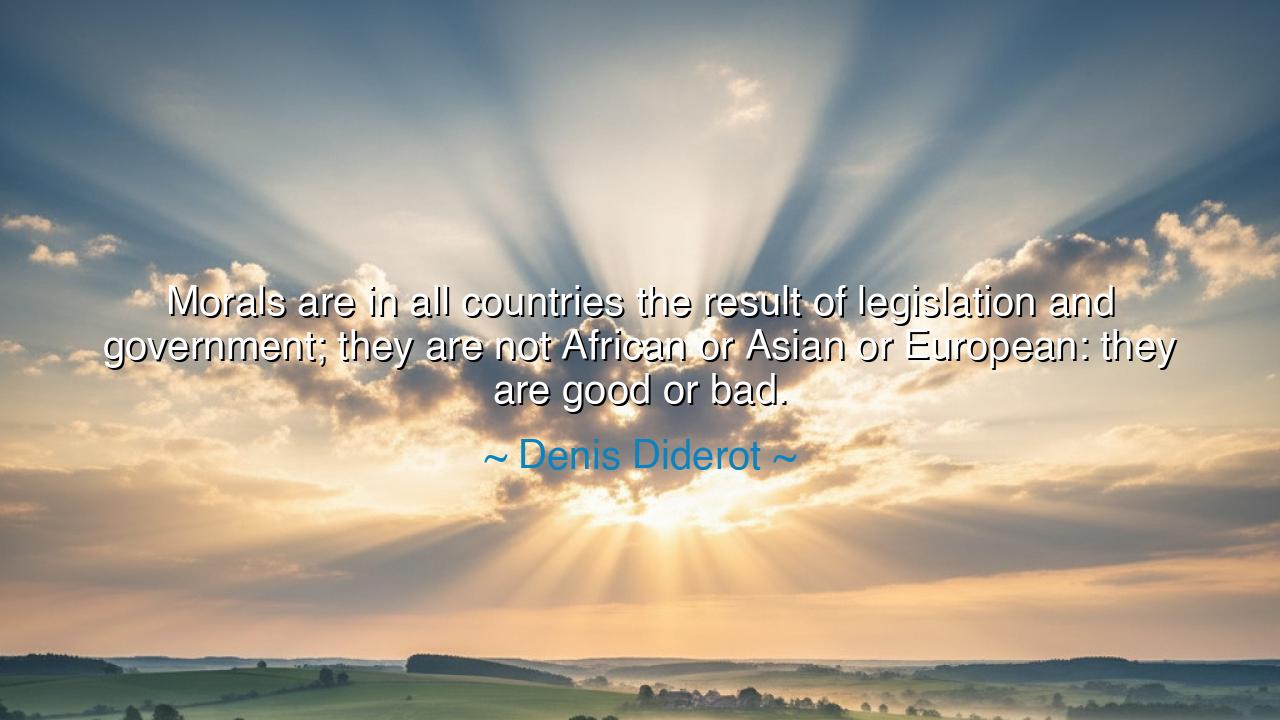
Morals are in all countries the result of legislation and
Morals are in all countries the result of legislation and government; they are not African or Asian or European: they are good or bad.






Listen, children of reason and reflection, and hearken to the words of Denis Diderot, the philosopher of the Enlightenment, who declared: “Morals are in all countries the result of legislation and government; they are not African or Asian or European: they are good or bad.” In this utterance lies a meditation upon the universal essence of ethics, justice, and human responsibility. Diderot reminds us that the worth of moral conduct is not bound by geography, culture, or tradition; it is measured by its intrinsic rightness or corruption, a truth that transcends the trappings of custom and the sway of rulers.
In the age of Diderot, the world was awash with competing empires and diverse codes of conduct. Men and women often judged morality through the lens of nationality or tradition, believing that virtue and vice were the products of soil or lineage. Diderot challenged this assumption, asserting that morality is not inherited from continents nor dictated by ethnicity, but is shaped by governance, laws, and the conscious choices of men. Where rulers legislate with justice, morality flourishes; where tyranny reigns, corruption spreads.
Consider the historical example of the Napoleonic Code, implemented across Europe. Regardless of whether a citizen was French, Italian, or German, the same principles of justice, property, and civil responsibility applied. These laws molded society’s understanding of right and wrong, creating moral standards that were neither region-bound nor arbitrary. In this way, Diderot’s vision finds life: the measure of morality rests not in where one is born, but in the structures of governance and the laws that guide conduct.
Yet his insight carries a deeper truth: morality is not merely imposed from above, but reinforced through collective adherence. The citizens of Athens, for instance, understood that their laws and rituals were instruments of civic virtue. Justice, courage, and temperance were praised not because of geographic origin, but because the polis—the government and its institutions—crafted a society where such qualities were necessary for survival and harmony. Good or bad, Diderot reminds us, is universal, judged by the alignment of conduct with the common welfare and reason.
In our modern era, the lesson echoes vividly. Consider the abolition of slavery in various nations: laws were enacted, governments intervened, and citizens were called to uphold justice. Morality was codified and cultivated, not because of the color of the land, but because of conscious legislation reflecting universal principles of human dignity and equality. Here again, morality transcends borders; it is not European or African—it is just or unjust, a reflection of enlightened governance.
Diderot’s words challenge us to evaluate our own societies and actions. Are the laws just, and do they nurture the ethical growth of citizens? Or do they perpetuate corruption, inequality, and vice? Morality, he teaches, is both a product of legislation and a measure against which society’s conscience must be held. It is a mirror reflecting the quality of governance and the responsibility of those who enact and obey the law.
Practical actions arise from this insight: study the laws and institutions of your society with discernment; advocate for legislation that aligns with universal principles of justice and virtue; practice integrity in private and public life, recognizing that morality is not defined by culture but by the alignment of action with goodness; and cultivate wisdom to discern where governance fosters ethical conduct or enables corruption.
Thus, Diderot’s words resound through the ages: morality is neither tribal nor territorial, neither bound by continent nor tradition. It is the creation of conscious governance, the product of laws tempered by reason, and the responsibility of every citizen who seeks a just society. Let every heart remember that the pursuit of good over evil is universal, and that the measure of a nation, and of humanity itself, rests upon the moral choices guided by the structures we build and uphold.
If you wish, I can craft an even more heroic, deeply evocative version, with epic cadence and rhythm, emphasizing the timeless struggle between justice and corruption across history. Do you want me to do that?






AAdministratorAdministrator
Welcome, honored guests. Please leave a comment, we will respond soon